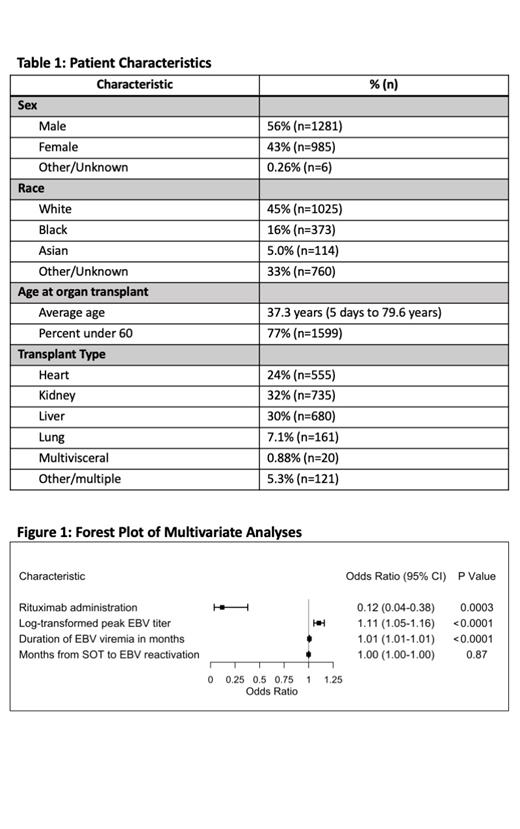The association between Epstein-Barr Virus (EBV) reactivation after solid organ transplantation (SOT) and Post-Transplant Lymphoproliferative Disorder (PTLD) is well described. There are currently no guidelines regarding the use of rituximab preemptively in patients with EBV viremia after SOT to reduce the risk of PTLD. We sought to determine whether rituximab in SOT patients with EBV viremia has benefit in preventing PTLD.
This retrospective analysis of electronic medical record data identified SOT recipients who experienced EBV viremia post-transplant between January 2010 and February 2023 at Columbia University Irving Medical Center (CUIMC). Data queries were clinically reviewed. Logistic regression analysis was performed to investigate the relationship between predictor variables including rituximab administration, log-transformed EBV peak titer, duration of EBV viremia, and time from SOT to EBV reactivation, with the binary primary outcome of PTLD diagnosis status. The analysis encompassed both univariate and multivariate logistic regression.
There were 2,168 patients who met the inclusion criteria of having EBV reactivation after SOT, out of 6,395 total SOT performed at CUIMC during this timeframe. Patient characteristics are described in table 1. The median peak EBV titer was 154 (range: not quantifiable - 5,335,816), the median duration of EBV viremia was 78 days (range: 1 - 6,980), and the median time from SOT to EBV reactivation was 688 days (range: 0-11103).
Of the 2,168 patients, 185/2168 (8.5%) received rituximab for indications other than PTLD including EBV viremia, treatment of rejection, antibody desensitization therapy/immunosuppression peri-transplant, and other non-transplant related indications (e.g. lupus nephritis). Of the patients who received rituximab, 182/185 (98.4%) did not develop PTLD. The 3/185 (1.6%) patients who did develop PTLD were all ≤ 20 years-old at time of diagnosis, and had EBER(+), monomorphic PTLD, diffuse large B-cell lymphoma type, with a non-germinal center phenotype, involving the gastrointestinal tract. Two were CD20 positive, all 3 had partial weak CD30 positivity, and all 3 had clonal immunoglobulin heavy chain rearrangements. Among the patients who did not receive preemptive rituximab post-SOT, 195/1983 (9.8%) developed PTLD, whereas 1788/1983 (90.2%) did not. Prior rituximab therapy for any indication in patients with EBV viremia post-SOT was associated with lower risk of subsequent PTLD by univariate analysis (0.14% vs 8.39%, OR 0.15, p = 0.0013, 95% CI 0.048-0.48). Receipt of rituximab (OR 0.12, p=0.0002), log-transformed peak EBV titer (OR 1.10, p<0.0001), and duration of EBV viremia in months (OR 1.01, p<0.0001) were all independently associated with risk for PTLD by multivariate analysis (figure 1). The relationship between time from SOT to EBV viremia was not significantly associated with development of PTLD.
This retrospective analysis suggests that administering preemptive rituximab in SOT patients with EBV viremia may lower the risk of developing PTLD. The fact that peak EBV titer and duration of EBV viremia remain associated with PTLD in multivariate analyses suggests that the benefit of rituximab may be independent of the degree or duration of EBV viremia. A prospective analysis of factors such as area under the curve of EBV exposure, HLA status, T cell clonotype diversity, organ type, and immunosuppression type, is needed to better understand individual risks for improved selection of those who would benefit from preemptive rituximab.
OffLabel Disclosure:
Lipsky:Synthekine: Consultancy; Beigene: Consultancy; AstraZeneca: Consultancy; AbbVie: Consultancy. Sawas:Acrotech Biopharma: Consultancy, Speakers Bureau; Daiichi Sankyo: Speakers Bureau; Seagen: Consultancy, Speakers Bureau; Roche: Current equity holder in publicly-traded company; Flatiron Health Inc.: Current Employment; Affimed: Research Funding. Reshef:TScan Therapeutics: Consultancy. Pro:Bio Secura: Honoraria; Seattle genetics: Honoraria. Amengual:AstraZeneca: Consultancy; Incyte: Consultancy; Epizyme: Honoraria.
Rituximab given to patients post solid organ transplant who did not yet develop post-transplant lymphoproliferative disorder, for other indications including EBV viremia, treatment of rejection, and antibody desensitization therapy/immunosuppression peri-transplant.


This feature is available to Subscribers Only
Sign In or Create an Account Close Modal